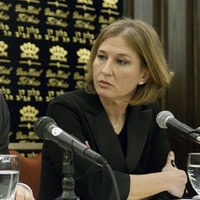For a few days last week, it seemed that relations between Britain and Israel were about to plunge into the diplomatic permafrost. But as the two countries emerge from their most bruising encounter in years, it appears that their ties might even end up strengthened.
The crisis broke when it was revealed that a London court, petitioned by a pro-Palestinian group under the legal doctrine of "universal jurisdiction," had issued a warrant for the arrest of Israeli opposition leader Tzipi Livni on charges of war crimes. Livni, who was foreign minister during Israel's military operation in Gaza early this year, was scheduled to appear at a Jewish charity fundraiser in London last Sunday. Instead, she canceled her visit and participated via a video link.
In an interview with the BBC, Livni struck a defiant note, declaring that "what needs to be put on trial here is the abuse of the British legal system." Israeli Prime Minister Binyamin Netanyahu also protested the move, and a spokesman for the Israeli Foreign Ministry warned that if not disavowed, the practice could "seriously compromise Britain's ability to play the active role in the Middle East peace process that it desires."

